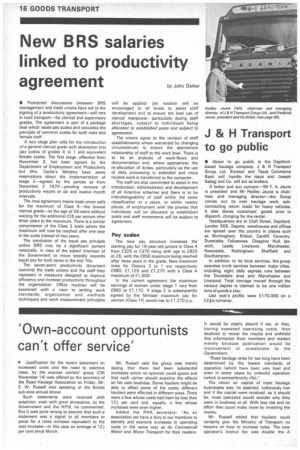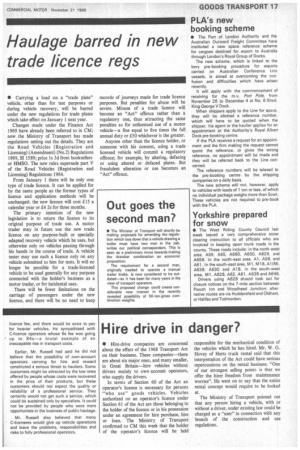' Own-account opportunists can't offer service'
Page 18

Page 19

If you've noticed an error in this article please click here to report it so we can fix it.
• Justification for the recent statement on increased costs and the need to examine rates, by the express carriers' group {CM November 14) was offered by the secretary of the Road Haulage Association on Friday. Mr. E. W. Russell was speaking at the Bristol sub-area annual dinner.
Such statements were received with suspicion, even with great annoyance, by the Government and the NPIB, he commented. But it was quite wrong to assume that such a statement was a signal to all members to press for a rates increase equivalent to the cost increase—in this case an average of 121 per cent since March.
Mr. Russell said the group was merely saying that there had been substantial increases which no operator could ignore and that each carrier should examine the effects on his own business. Some hauliers might be able to offset some of the costs; different hauliers were affected in different ways. There were a few whose costs had risen by less than 12-1, per cent and, equally, a few whose increases were even higher.
Added the RHA secretary: "As an association we have a duty to our members to identify and examine increases in operating costs in the same way as do Commercial Motor and Motor Transport for their readers. It would be utterly absurd if we, or they, having assessed operating costs, then declined to reveal the results and withheld this information from members and readers merely because publication would be inconvenient or unwelcome to the Government.
"Road haulage rates for too long have been determined by the lowest standards of operation (which have been very low) and even in some cases by unlawful operation (which is extraordinarily rife)."
The return on capital of most haulage businesses was, he asserted, ludicrously low and if the capital were revalued, as it should be, most operators would wonder why they were in business at all. With less risk and no effort they could make more by investing the money.
Mr. Russell added that hauliers could certainly give the Ministry of Transport no lessons on how to increase rates. The new operator's licence fee was double the A licence fee, and there would be extra to pay for heavier vehicles. He sympathised with C-licence operators whose fis fee was going up to 84s—a brutal example of an inescapable rise in transport costs.
Earlier, Mr. Russell had said he did not believe that the possibility of own-account operators carrying for hire and reward constituted a serious threat to hauliers. Some customers might be attracted by the low rates offered by people whose costs were recovered in the price of their products, but these customers should not expect the quality or reliability of a professional service. They certainly would not get such a service, which could be sustained only by specialists. It could not be provided by people who were mere opportunists in the business of public haulage.
Mr. Russell also believed that many C-licensees would give up vehicle operations and leave the problems, responsibilities and risks to fully professional operators.




































































































